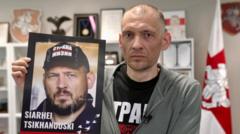After a brief return to Istanbul, BBC correspondent Mark Lowen was detained and deported for allegedly threatening public order. His experiences highlight the ongoing media suppression in Turkey amidst rising protests demanding democratic restoration.
BBC Correspondent Mark Lowen's Disconcerting Deportation from Turkey

BBC Correspondent Mark Lowen's Disconcerting Deportation from Turkey
Mark Lowen, a BBC reporter, recounts his abrupt deportation from Turkey while covering significant protests that emerged in response to the arrest of a prominent opposition leader, Ekrem Imamoglu.
In a startling turn of events, BBC's Mark Lowen found himself embroiled in a diplomatic crisis just days into his return to Turkey, a country he previously called home. Having sent a family message expressing joy at his arrival, he abruptly faced an urgent summons from the hotel receptionist, leading to his transient encounter with Turkish authorities.
Upon descending to the lobby, Lowen was met by three plainclothes policemen who demanded his passport and directed him away, attempting to shield the situation from his colleagues' cameras. Only three days into his reporting on anti-government demonstrations following the arrest of Ekrem Imamoglu, the popular mayor of Istanbul and potential rival to President Recep Tayyip Erdogan, he was taken to police headquarters, where he spent the next seven hours under observation.
Despite the chilling circumstances, Lower reported a surprisingly cooperative atmosphere among some officers, who personally expressed their disagreement with the orders handed down from above. Among them was a police officer who even offered a supportive embrace, expressing hopes for Lowen's eventual freedom. However, the situation turned stark as he was later moved to a more secure foreigners' custody unit at the Istanbul police, where he was fingerprinted and denied legal access, all the while dealing with officers smoking incessantly around him.
Lowen was formally informed of his deportation at 2:30 am, labeled a "'threat to public order," while the authorities declined to clarify what this entitled. Amidst a barrage of noise and lack of sleep in his holding room at the airport, he prepared for a one-way flight to London, seventeen hours after his initial arrest.
The Turkish government later issued a statement regarding Lowen's lack of proper accreditation, which was not disclosed during his detention, suggesting it was a calculated justification following the exposure of the incident. While Lowen did not face any maltreatment, he recognized his privilege in having strong institutional backing from the BBC and the British Consulate—protections that many other journalists in Turkey do not possess.
Within the larger context, his deportation reflects a troubling pattern in Turkey, known for its oppressive atmosphere towards media, currently ranked 158th in the Press Freedom Index. In light of ongoing protests fueled by Imamoglu's arrest—seen as an attack on democracy in a country increasingly leaning towards authoritarianism—Lowen's experience serves as a critical lens on the complications facing both press freedom and political resistance in Turkey.
As President Erdogan dismisses the protests as "street terrorism," the larger question looms of whether these far-reaching demonstrations can maintain momentum or will simply dissipate under the pressure of his longstanding hold on power. Those on the streets may voice demands for change, but the outcome remains uncertain in the face of Turkey's complex political landscape.






















